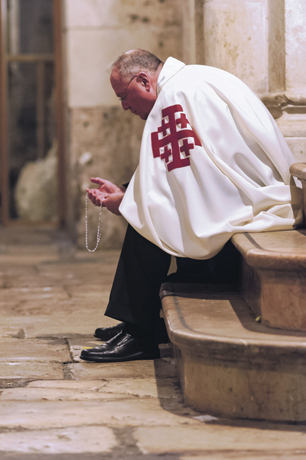by Beth Griffin,

Natural law is a concept of objective truth, not religious preference, and reliance on natural law and human rights will move the culture and its laws in the direction of authentic respect for human life, Cardinal-designate Timothy M. Dolan of New York said in an address Jan. 24.
Cardinal-designate Dolan, speaking on “Law & the Gospel of Life,” gave the inaugural talk in a lecture series sponsored by the Institute on Religion, Law and Lawyers’ Work at Jesuit-run Fordham University School of Law.
“Our society has caricatured natural law as some medieval tool the church is using to justify its own unique and antiquated system of teaching. Of course, the opposite is true,” he said. “Natural law theory is not uniquely Catholic, it’s human.
“Some of the greatest exponents of the natural law, like Aristotle and Cicero, never heard of the Catholic Church. These things we teach are not true because they happen to be taught by the church. We teach them because they happen to be true. Their truth antedates the church.”
According to Cardinal-designate Dolan, the most effective way to engage in conversations about human life with people who disagree with the Church’s position is to “untether” discussions of natural law “from what might be thought of as unique Catholic confessionalism” and reference the writings of non-Catholic authors. “It’s not a Catholic thing. It’s a natural thing. It’s a human thing.”
Cardinal-designate Dolan said Blessed John Paul II’s encyclical “Evangelium Vitae,” described the culture of death as one that denies the basic solidarity inherent in the human person, is obsessed with efficiency and convenience, and wages a war of the powerful against the weak.
“Can sustained human rights, girded by law, survive in such a culture?” Cardinal-designate Dolan asked. “The pragmatic, utilitarian world view depends upon sand to construct a system of laws protecting human rights, particularly that of life itself, since everything is constantly being re-negotiated, based on drifting dunes of utility, convenience, privacy, and self-interest.”
Cardinal-designate Dolan said, “It is a bedrock feature of modern political and legal theory that only neutral, utilitarian principles can provide a basis for public policy discussions and law, and that appeals to transcendent values, such as religion, cannot legitimately be presented.”
“The Gospel of life proposes an alternative vision of law and culture, one that provides an antidote to the pragmatic nihilism that produces a culture of death. It seeks to recapture the essential relationship between the civil law and the moral law, and to foster a culture in which all human life is valued and authentic human development is possible.”
Cardinal-designate Dolan said, “The Gospel of life calls us specifically to offer a clear, faith-based view of humanity as a basis for human law. As Christians, we propose that truth can only be known and freedom truly exercised by recognizing that they are a gift from God.”
He said an important proposition of the Gospel of life is “that the dignity of the human person and respect for inviolable human rights are not just based on divine revelation, but on ‘an objective moral law which, as the ‘natural law’ written in the human heart, is the obligatory point of reference for civil law itself.’”
Cardinal-designate Dolan said, “A reliance on the natural law, and human rights, will enable us to move the culture, and thus our laws, in the direction of authentic respect for human life. It will be a gradual, incremental process … and require compromise and acceptance of intermediary steps.”
He described pragmatism, utilitarianism and consumerism as a trinity of related culprits that chisel away at the culture of life and “seem to be ascendant in culture and normative in making laws.”
Cardinal-designate Dolan said, “A baby is useless and impractical from a raw, pragmatic, utilitarian or consumerist view” and is seen by some in the culture of death “as a commodity, an accessory. We have babies, if at all, to satisfy our desires, not to sacrifice for theirs; to fulfill our needs, not to invite us to spend the rest of our lives fulfilling their needs; to reward us, not because we want to give to them.”
“To this culture of death, the church boldly and joyfully promotes the culture of life,” he said.
Cardinal-designate Dolan said people can promote the culture of life by living, speaking and teaching the truth in love. “Usually, we will attract more people by the compelling nature of our love and, in the end, that will be what most hypnotizes and magnetizes people.”
In a response to Cardinal-designate Dolan’s address, Jacqueline Nolan-Haley, a Fordham law professor, said the Gospel of life “is pulling us to bring greater morality and justice to civil law.”
Monica McDaniel, a 2009 Fordham Law graduate and associate at the White & Case firm, said the culture of death has infiltrated private practice and law schools, both secular and Catholic. “Law schools, many nonprofit human rights organizations and the pro bono departments of many law firms are generally confused about human rights because they lack the sound ethical philosophy of the natural law.”
She said “pro-abortion” initiatives dominate the pro bono departments of virtually all major law firms because pro-life lawyers are silent. She encouraged fellow young lawyers to spread the Gospel of life one-on-one, challenge people who make dubious claims and oppose unethical practices.
